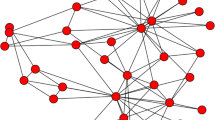Abstract
This paper presents the results from a minimum-effort game in which individuals can observe the choices of others in real time. We find that under perfect monitoring almost all groups coordinate at the payoff-dominant equilibrium. However, when individuals can only observe the actions of their immediate neighbors in a circle network, monitoring improves neither coordination nor efficiency relative to a baseline treatment without real-time monitoring. We argue that the inefficacy of imperfect monitoring is due to information uncertainty, that is, uncertainty about the correct interpretation of a neighbor’s actions. Information uncertainty prevents individuals from inferring safely that their group has managed to coordinate from the available information.
Similar content being viewed by others
References
Anderson, S., Goeree, J., & Holt, C. (2001). Minimum-effort coordination games: stochastic potential and logit equilibrium. Games and Economic Behavior, 34, 177–199.
Bangun, L., Chaudhuri, A., Prak, P., & Zhou, C. (2006). Common and almost common knowledge of credible assignments in a coordination game. Economics Bulletin, 3, 1–10.
Berninghaus, S. K., & Ehrhart, K.-M. (1998). Time horizon and equilibrium selection in tacit coordination games: experimental results. Journal of Economic Behavior & Organization, 37, 231–248.
Berninghaus, S. K., & Ehrhart, K.-M. (2001). Coordination and Information: recent experimental evidence. Economics Letters, 73, 345–351.
Blume, A., & Ortmann, A. (2007). The effects of costless pre-play communication: experimental evidence from games with Pareto-ranked equilibria. Journal of Economic Theory, 132, 274–290.
Brandts, J., & Cooper, D. (2006). Observability and overcoming coordination failure in organizations. Experimental Economics, 9, 407–423.
Chaudhuri, A., Schotter, A., & Sopher, B. (2009). Talking ourselves to efficiency: coordination in inter-generational minimum effort games with private, almost common and common knowledge of advice. Economic Journal, 119, 91–122.
Cooper, R., De Jong, D., Forsythe, R., & Ross, T. (1992). Communication in coordination games. The Quarterly Journal of Economics, 107, 739–771.
Croson, R., & Donohue, K. (2006). Behavioral causes of the bullwhip effect and the observed value of inventory information. Management Science, 52(3), 323–336.
Devetag, G. (2005). Precedent transfer in coordination games: an experiment. Economics Letters, 89, 227–232.
Devetag, G., & Ortmann, A. (2007). When and Why? A critical survey on coordination failure in the laboratory. Experimental Economics, 10, 331–344.
Dorsey, R. (1992). The voluntary contributions mechanism with real time revisions. Public Choice, 73, 261–282.
Duffy, J., & Feltovich, N. (2002). Do actions speak louder than words? Observation vs. cheap talk as coordination devices. Games and Economic Behavior, 39, 1–27.
Duffy, J. & Feltovich, N. (2006). Words, deeds and lies: strategic behavior in games with multiple signals. Review of Economic Studies, 73, 669–688.
Duffy, J., Ochs, J. & Vesterlund, L. (2007). Giving little by little: dynamic voluntary contribution games. Journal of Public Economics, 91, 1708–1730.
Friedman, D., & Oprea, R. (2010). A continuous dilemma. Working Paper, University of California, Santa Cruz.
Gangadharan, L., & Nikiforakis, N. (2009). Does the size of the action set matter for cooperation?. Economics Letters, 104, 115–117.
Goeree, J., & Holt, C. (2005). An experimental study of costly coordination. Games and Economic Behavior, 51, 349–364.
Goren, H., Kurzban, R., & Rapoport, A. (2003). Social loafing vs. social enhancement: public good provisioning in real time with irrevocable commitments. Organizational Behavior and Human Decision Processes, 90, 277–290.
Goren, H., Rapoport, A., & Kurzban, R. (2004). Commitment in a real time step level public goods game with asymmetrical players and continuous contributions. Journal of Behavioral Decision Making, 17, 17–37.
Kurzban, R., McCabe, K., Smith, V., & Wilson, B. J. (2001). Incremental commitment and reciprocity in a real-time public goods game. Personality & Social Psychology Bulletin, 27, 1662–1673.
Kurzban, R., Rigdon, M., & Wilson, B.J. (2008). Incremental approaches in establishing trust. Experimental Economics, 11, 370–389.
Schmidt, D., Shupp, R., Walker, J., & Ostrom, E. (2003). Playing safe in coordination games: the role of risk dominance, payoff dominance, social history, and reputation. Games and Economic Behavior, 42, 281–299.
Van Huyck, J. B., Battalio, R. C., & Beil, R.O. (1990). Tacit coordination games, strategic uncertainty, and coordination failure. The American Economic Review, 80, 234–248.
Van Huyck, J., Gillette, A. & Battalio, R. (1992). Credible assignments in coordination games. Games and Economic Behavior, 4, 606–626.
Author information
Authors and Affiliations
Corresponding author
Rights and permissions
About this article
Cite this article
Deck, C., Nikiforakis, N. Perfect and imperfect real-time monitoring in a minimum-effort game. Exp Econ 15, 71–88 (2012). https://doi.org/10.1007/s10683-011-9289-1
Received:
Accepted:
Published:
Issue Date:
DOI: https://doi.org/10.1007/s10683-011-9289-1




